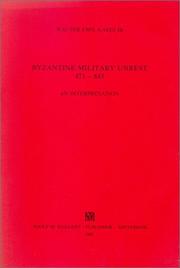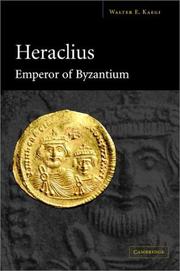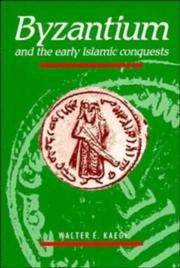| Listing 1 - 10 of 20 | << page >> |
Sort by
|

ISBN: 9025609023 9789025609023 Year: 1981 Publisher: Amsterdam Hakkert
Abstract | Keywords | Export | Availability | Bookmark
 Loading...
Loading...Choose an application
- Reference Manager
- EndNote
- RefWorks (Direct export to RefWorks)
Byzantine Empire --- Empire byzantin --- Military history --- Histoire militaire --- History, Military --- 949.5.01 --- Geschiedenis van Byzantium: Constantinus tot Theodosius III--(323-716) --- -Byzantine Empire --- -History, Military --- -949.5.01 --- 949.5.01 Geschiedenis van Byzantium: Constantinus tot Theodosius III--(323-716) --- Byzantine Empire - History, Military - To 527 --- Byzantine Empire - History, Military - 527-1081

ISBN: 0860781100 9780860781103 Year: 1982 Volume: CS162 Publisher: Aldershot (Hants): Variorum,
Abstract | Keywords | Export | Availability | Bookmark
 Loading...
Loading...Choose an application
- Reference Manager
- EndNote
- RefWorks (Direct export to RefWorks)
Julian, --- Byzantine Empire --- -Byzantine Empire --- -History --- History, Military --- -History, Military --- -Julian, --- History --- Julian, - Emperor of Rome, - 331-363 --- Byzantine Empire - History - To 527 --- Byzantine Empire - History, Military - 527-1081 --- Byzantine Empire - History, Military - To 527
Book
ISBN: 0691035105 0691622507 0691649286 1400879558 9780691035109 Year: 1968 Publisher: Princeton (N.J.): Princeton university press,
Abstract | Keywords | Export | Availability | Bookmark
 Loading...
Loading...Choose an application
- Reference Manager
- EndNote
- RefWorks (Direct export to RefWorks)
Professor Kaegi studies the response of the eastern half of the Roman Empire to the disintegration of western Rome, usually dated from the sack of the city of Rome in A.D. 410. Using sources from the fifth and sixth centuries, he shows that the eastern empire had a clear awareness of, interest in, and definite opinions on the disasters that befell Rome in the west. Religious arguments, both Pagan and Christian, tended to dominate the thinking of the intellectuals, but economic and diplomatic activity also contributed to the reaction. This reaction, the author finds, was in a distinctly eastern manner and reflected quite naturally the special conditions prevailing in the eastern provinces. Originally published in 1968.The Princeton Legacy Library uses the latest print-on-demand technology to again make available previously out-of-print books from the distinguished backlist of Princeton University Press. These editions preserve the original texts of these important books while presenting them in durable paperback and hardcover editions. The goal of the Princeton Legacy Library is to vastly increase access to the rich scholarly heritage found in the thousands of books published by Princeton University Press since its founding in 1905.
Rome --- Byzantine Empire --- History --- Relations --- Europe --- Byzantium (Empire) --- Vizantii︠a︡ --- Bajo Imperio --- Bizancjum --- Byzantinē Autokratoria --- Vyzantinon Kratos --- Vyzantinē Autokratoria --- Impero bizantino --- Bizantia --- Rim --- Roman Empire --- Roman Republic (510-30 B.C.) --- Romi (Empire) --- Rome (Italy) --- HISTORY / Ancient / Rome. --- Rome - History - Empire, 284-476 --- Byzantine Empire - Relations - Rome --- Rome - Relations - Byzantine Empire

ISBN: 0521814596 9780521814591 Year: 2003 Publisher: Cambridge, U.K.: Cambridge university press,
Abstract | Keywords | Export | Availability | Bookmark
 Loading...
Loading...Choose an application
- Reference Manager
- EndNote
- RefWorks (Direct export to RefWorks)
This book evaluates the life and empire of the pivotal yet controversial and poorly understood Byzantine emperor Heraclius (AD 610-641), a contemporary of the Prophet Muhammad. Heraclius' reign is critical for understanding the background to fundamental changes in the Balkans and the Middle East, including the emergence of Islam, at the end of antiquity. Heraclius captured and lost important swathes of territory, including Jerusalem and Syria and Egypt. Skills in exploiting divisions within the ranks of his opponents, and encouraging the switching of sides and the breakdown of morale, provided Heraclius with his greatest triumphs, yet they proved to be of little value when he finally confronted the early Islamic conquests. The author synthesises diverse primary sources, including those in Greek and Arabic, in the light of recent historical scholarship. The varied Mediterranean and Middle Eastern context stretches from North Africa to Syria, Armenia and what is modern Iraq.
Emperors --- Heraclius, --- Byzantine Empire --- History --- Heraclius Emperor of the East --- -Heraclius Emperor of the East --- Eracle, --- Eraclio, --- Hērakleios, --- Hiraql, --- Empereurs --- Biography. --- Biographies --- Empire byzantin --- Histoire --- Heraclius --- Heraclius, 610-641 --- Biography --- Emperors - Byzantine Empire - Biography --- Heraclius, - Emperor of the East, - approximately 575-641 --- Byzantine Empire - History - Heraclius, 610-641

ISBN: 9780511470615 9780521411721 9780521484558 9781461949084 1461949084 0511470614 0521411726 0521484553 1139881884 1107384907 1107383692 1107390133 110739855X 0511953593 0511879741 Year: 1995 Publisher: Cambridge: Cambridge university press,
Abstract | Keywords | Export | Availability | Bookmark
 Loading...
Loading...Choose an application
- Reference Manager
- EndNote
- RefWorks (Direct export to RefWorks)
This is a study of how and why the Byzantine Empire lost many of its most valuable provinces to Islamic (Arab) conquerors in the seventh century, provinces which included Syria, Palestine, Mesopotamia, and Armenia. It investigates conditions on the eve of those conquests, mistakes in Byzantine policy toward the Arabs, the course of the military campaigns, and the problem of local official and civilian collaboration with the Muslims. It also seeks to explain how, after terrible losses, the Byzantine government achieved some intellectual rationalisation of its disasters and began the complex process of transforming and adapting its fiscal and military institutions and political controls in order to prevent further disintegration.
Byzantine Empire --- Islamic Empire --- History --- Empire byzantin --- Empire islamique --- Histoire --- 527-1081 --- 622-661 --- Byzantine Empire - History - 527-1081. --- Islamic Empire - History - 622-661. --- Arts and Humanities
Book
Year: 1968 Publisher: Princeton (N.J.) : Princeton university press,
Abstract | Keywords | Export | Availability | Bookmark
 Loading...
Loading...Choose an application
- Reference Manager
- EndNote
- RefWorks (Direct export to RefWorks)
Book
Year: 1968 Publisher: Princeton, N.J. Princeton University Press
Abstract | Keywords | Export | Availability | Bookmark
 Loading...
Loading...Choose an application
- Reference Manager
- EndNote
- RefWorks (Direct export to RefWorks)
Book
Year: 1968 Publisher: Princeton, N.J. : Princeton University Press,
Abstract | Keywords | Export | Availability | Bookmark
 Loading...
Loading...Choose an application
- Reference Manager
- EndNote
- RefWorks (Direct export to RefWorks)
Byzantine Empire --- Rome --- Empire byzantin --- Relations --- History --- Histoire
Book
ISBN: 0916586952 Year: 1983 Publisher: Brookline Hellenic college press
Abstract | Keywords | Export | Availability | Bookmark
 Loading...
Loading...Choose an application
- Reference Manager
- EndNote
- RefWorks (Direct export to RefWorks)
Military art and science --- Strategy --- Tactics --- History --- Byzantine Empire --- History, Military
Book
Year: 1995 Publisher: Cambridge University press
Abstract | Keywords | Export | Availability | Bookmark
 Loading...
Loading...Choose an application
- Reference Manager
- EndNote
- RefWorks (Direct export to RefWorks)
| Listing 1 - 10 of 20 | << page >> |
Sort by
|

 Search
Search Feedback
Feedback About UniCat
About UniCat  Help
Help News
News